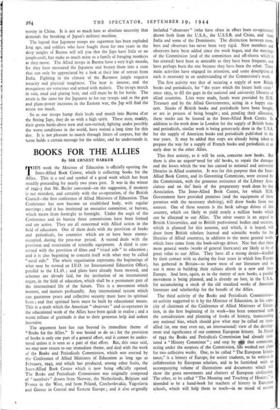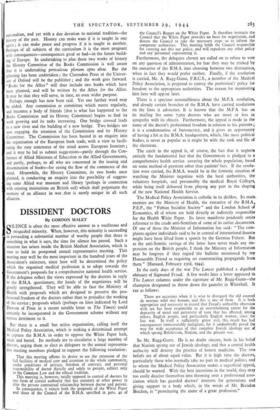BOOKS FOR THE ALLIES
By SIR ERNEST BARKER HIS week the Minister of Education is officially opening the T
Inter-Allied Book Centre, which is collecting books for the Allies. This is a seal and symbol of a good work which has been steadily proceeding for nearly two years past. It was in the winter of 1942-3 that Mr. Butler convened—on the suggestion, if memory is nut mistaken, and certainly with the co-operation, of the British Council—the first conference of Allied Ministers of Education. That Conference has now become an established body, with regular meetings ; and it has instituted an executive committee, or bureau, which meets from fortnight to fortnight. Under the aegis of the Conference and its bureau three commissions have been formed and are active. They are all concerned with Allied action in the field of education. One of them deals with the provision of books and periodicals, for countries which are or have been enemy- occupied, during the post-war period. A-second deals with the provision and restoration of scientific equipment. A third is con- cerned with the provision of films and " visual aids " to education ; and it is also beginning to concern itself with what may be called "aural aids." The whole organisation represents the beginnings of what may be termed an I.E.O. (or International Education Office), parallel to the I.L.O. ; and plans have already been mooted, and schemes are already laid, for the institution of an international organ, in the field of education, which shall be a permanent part of the international life of the future. This is a movement which matters, and matters profoundly. Any international system which can guarantee peace and collective security must have its spiritual basis ; and that spiritual basis must be built by educational means. This is a truth which the American " observers " and co-operators in the educational work of the Allies have been quick to realise ; and a warm tribute of gratitude is due to their generous help and ardent incentive.
The argument here has run beyond its immediate theme of " Books for the Allies." It was bound to do so ; for the provision of books is only one part of a general effort, and it cannot be under- stood unless it is seen as a part of that effort. But, this once said, we may now return to our immediate theme, and deal with the work of the Books and Periodicals Commission, which was erected by the Conference of Allied Ministers of Education as long ago as February, 1943, and which has produced, among other fruits, the Inter-Allied Book Centre which is now being officially opened. The Books and Periodicals Commission was originally composed of " members " drawn from Norway, the Netherlands, Belgium and France in the West, and from Poland, Czechoslovakia, Yugoslavia and Greece in Central and Eastern Europe ; and it also originally included " observers " (who have often in effect been co-operators) drawn both from the U.S.A., the U.S.S.R. and China, and from India and some of the Dominions. The distinction between mem- bers and observers has never been very rigid. New members and . observers have been added since the work began, and the meetings of the Commission (and of the committees and off-shoots which it has created) have been as amicable as they have been frequent, and have perhaps been the one because they have been the other. Three main activities have engaged its attention, and some description of each is necessary to an understanding of the Commission's work.
The first activity was that of securing a supply of new British books and periodicals, for " the years which the locust hath eaten" since x935, to fill the gaps in the national and university libraries of allied countries. Lists were made, funds were provided by H.M. Treasury and by the Allied Governments, acting in a happy con- cert. Stocks of British books and periodicals have been bought, or are in process of being bought ; and, pending their allocation, these stocks can be housed in the Inter-Allied Book Centre. In addition to the work done in London for the supply of British books and periodicals, similar work is being genercusly done in the U.S.A. for the supply of American books and periodicals published in the war years. It may be added that steps are already being taken to prepare the way for a supply of French books and periodicals at an early date to the other Allies.
This first activity, as it will be seen, concerns new books. But there is also an urgent•need for old books, to repair the damages and the losses which the war has caused to national and university libraries in Allied countries. It was for this purpose that the Inter- Allied Book Centre, and its Governing Committee, were created by the Commission, with the generous assistance of the Library Asso- ciation and on the basis of the preparatory work done by that Association. The Inter-Allied Book Centre, for which H.M. Government have provided premises (and the equipment of those premises with the necessary shelving), will draw books from two sources. One of these sources is the book salvage drives of this country, which are likely to yield nearly a million books which can be allocated to our Allies. The other source is an appeal to British Universities, and to British professional bodies -and societies, which is planned for this autumn, and which, it is hoped, will draw from British scholars learned and scientific works for the libraries of Allied countries, in addition to the more general works which have come from the book-salvage drives. Nor but that these more general works (works of general literature) are likely to be of great value to our Allies. They have all a strong desire—kindled by their contact with us during the four years in which free Europe has gathered in Britain—to know most of our literature and to use it more in building their culture afresh in a new and freer Europe. And here, again, as in the matter of new books, a parallel movement is being planned, and is already on foot, in the U.S.A, for accumulating a stock of the old standard works of American literature and scholarship for the benefit of the Allies.
The third activity of the Books and Periodicals Commission— an activity suggested to it ky the Minister of Education, in his capa- city of chairman of the Conference of Allied Ministers of Educa- tion, in the first beginning of its work—has been concerned with the consideration and planning of books of history, transcending any national bias, which should give what may be called an inter- allied (or, one may even say, an international) view of the develop- ment and significance of our common European history. In Mardi of 1943 the Books and Periodicals Commission had already insti- tuted a "History Committee " ; and step by that committee, acting under the auspices of the Commission, h s worked out plans for two collective works. One, to be called " The European Inheri- tance," is a history of Europe, for senior students, to be written in collaboration by European scholars, and to be furnished with an accompanying volume of illustrations and documents which will show the great movements and charters of European civilisation. The other, to be called " The Meaning and Teaching of History," is intended to be a hand-book for teachers of history in European schools, which will help them to teach—in no mood of narrow nationalism, and yet with a due devotion to national tradition—the history of the past. History can make wars if it is taught in one spirit ; it can make peace and - progress if it is taught in another. Perhaps of all subjects of the curriculum it is the most pregnant with consequences—consequences good or bad—in the future build- ing of Europe. In undertaking to plan these two works of history the History Committee of the Books Commission is well aware that it is undertaking periculosae plenum opus aleae. But the planning has been undertaken ; the Clarendon Press of the'Univer- sity of Oxford will be the publisher ; and the work goes forward. "Books for the Allies" will thus include two books which have been planned, and will be written by the Allies for the Allies. It may be that they will serve, in time, an even wider purpose.
Perhaps enough has now been said. Yet one further word may be added. Any commission or committee which meets regularly, and becomes a body of friends (that is what has happened to the Books Commission and its History Committee) begins to find its work growing and its tasks increasing. One bridge crossed leads to a new river and the building of a new bridge. Two bridges are now engaging the attention of the Commission and its History Committee. The Commission has been busied in an enquiry into the organisation of the European book trade, with a view to facili- tating the easy commerce of the mind across European frontiers ; and it may be led to submit suggestions—partly through the Con- ference of Allied Ministers of Education to the Allied Governments, and partly, perhaps, to all who are concerned in • the issuing and dissemination of books—for easing the flow of the commerce of the mind. Meanwhile, the History Committee, its two books once planned, is conducting an enquiry into the possibility of suggest- ing some Allied war museum and library (perhaps in connection with existing institutions on British soil) which shall perpetuate the memory of an affiance in war ,that is surely unique in all such alliances.



























 Previous page
Previous page